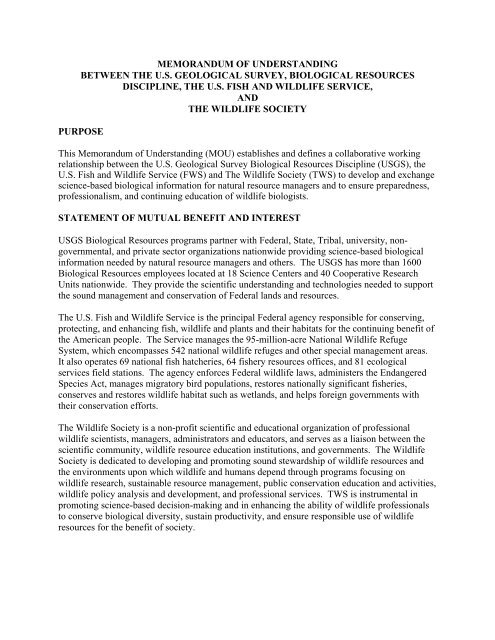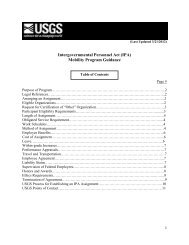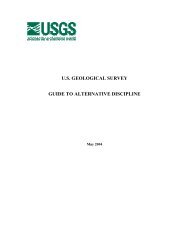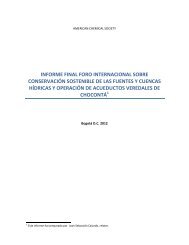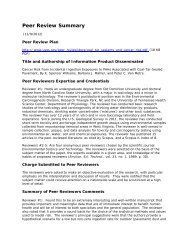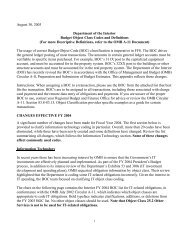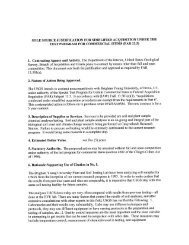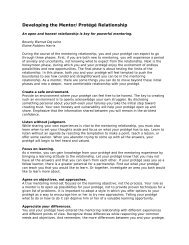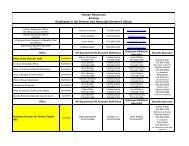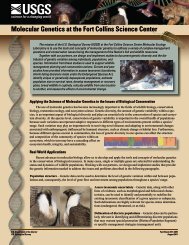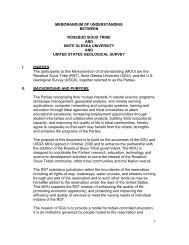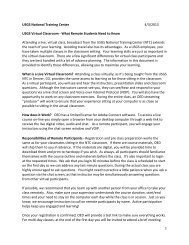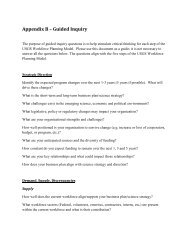MEMORANDUM OF UNDERSTANDING BETWEEN ... - the USGS
MEMORANDUM OF UNDERSTANDING BETWEEN ... - the USGS
MEMORANDUM OF UNDERSTANDING BETWEEN ... - the USGS
Create successful ePaper yourself
Turn your PDF publications into a flip-book with our unique Google optimized e-Paper software.
<strong>MEMORANDUM</strong> <strong>OF</strong> <strong>UNDERSTANDING</strong><br />
<strong>BETWEEN</strong> THE U.S. GEOLOGICAL SURVEY, BIOLOGICAL RESOURCES<br />
DISCIPLINE, THE U.S. FISH AND WILDLIFE SERVICE,<br />
AND<br />
THE WILDLIFE SOCIETY<br />
PURPOSE<br />
This Memorandum of Understanding (MOU) establishes and defines a collaborative working<br />
relationship between <strong>the</strong> U.S. Geological Survey Biological Resources Discipline (<strong>USGS</strong>), <strong>the</strong><br />
U.S. Fish and Wildlife Service (FWS) and The Wildlife Society (TWS) to develop and exchange<br />
science-based biological information for natural resource managers and to ensure preparedness,<br />
professionalism, and continuing education of wildlife biologists.<br />
STATEMENT <strong>OF</strong> MUTUAL BENEFIT AND INTEREST<br />
<strong>USGS</strong> Biological Resources programs partner with Federal, State, Tribal, university, nongovernmental,<br />
and private sector organizations nationwide providing science-based biological<br />
information needed by natural resource managers and o<strong>the</strong>rs. The <strong>USGS</strong> has more than 1600<br />
Biological Resources employees located at 18 Science Centers and 40 Cooperative Research<br />
Units nationwide. They provide <strong>the</strong> scientific understanding and technologies needed to support<br />
<strong>the</strong> sound management and conservation of Federal lands and resources.<br />
The U.S. Fish and Wildlife Service is <strong>the</strong> principal Federal agency responsible for conserving,<br />
protecting, and enhancing fish, wildlife and plants and <strong>the</strong>ir habitats for <strong>the</strong> continuing benefit of<br />
<strong>the</strong> American people. The Service manages <strong>the</strong> 95-million-acre National Wildlife Refuge<br />
System, which encompasses 542 national wildlife refuges and o<strong>the</strong>r special management areas.<br />
It also operates 69 national fish hatcheries, 64 fishery resources offices, and 81 ecological<br />
services field stations. The agency enforces Federal wildlife laws, administers <strong>the</strong> Endangered<br />
Species Act, manages migratory bird populations, restores nationally significant fisheries,<br />
conserves and restores wildlife habitat such as wetlands, and helps foreign governments with<br />
<strong>the</strong>ir conservation efforts.<br />
The Wildlife Society is a non-profit scientific and educational organization of professional<br />
wildlife scientists, managers, administrators and educators, and serves as a liaison between <strong>the</strong><br />
scientific community, wildlife resource education institutions, and governments. The Wildlife<br />
Society is dedicated to developing and promoting sound stewardship of wildlife resources and<br />
<strong>the</strong> environments upon which wildlife and humans depend through programs focusing on<br />
wildlife research, sustainable resource management, public conservation education and activities,<br />
wildlife policy analysis and development, and professional services. TWS is instrumental in<br />
promoting science-based decision-making and in enhancing <strong>the</strong> ability of wildlife professionals<br />
to conserve biological diversity, sustain productivity, and ensure responsible use of wildlife<br />
resources for <strong>the</strong> benefit of society.
Research, monitoring and evaluation, and promotion of professionalism in wildlife biology and<br />
management would benefit from cooperative action. Collaboration between <strong>the</strong> <strong>USGS</strong>, <strong>the</strong><br />
FWS, and TWS presents a unique opportunity to maximize <strong>the</strong> skills and knowledge of each<br />
entity. The focus of this agreement is to improve collaboration among our organizations with <strong>the</strong><br />
goal of addressing pressing wildlife resource issues and enhancing <strong>the</strong> profession of wildlife<br />
biology and management.<br />
A liaison position between <strong>the</strong> <strong>USGS</strong>, <strong>the</strong> FWS, and TWS will streng<strong>the</strong>n science, foster a<br />
collaborative working relationship, aid in identifying and developing initiatives and projects that<br />
have mutual interest to <strong>the</strong> <strong>USGS</strong>, <strong>the</strong> FWS, and TWS, and will benefit wildlife resource<br />
managers regionally and nationally. The liaison will work toward closer collaboration between<br />
<strong>the</strong> <strong>USGS</strong>, <strong>the</strong> FWS, and TWS, o<strong>the</strong>r Federal agencies, and congressional offices concerning<br />
wildlife resource science and management, with <strong>the</strong> goal of providing science-based biological<br />
information needed by natural resource managers.<br />
<strong>USGS</strong> AND FWS SHALL:<br />
1. Share resources and expertise with TWS;<br />
2. Encourage <strong>USGS</strong> and FWS wildlife biologists to join TWS and similar professional<br />
organizations, pursue professional certification through those organizations, and engage<br />
in appropriate leadership roles;<br />
3. Assist TWS in making its scientific journals available to <strong>the</strong> <strong>USGS</strong> and <strong>the</strong> FWS in<br />
electronic format;<br />
4. Assist TWS with development of newly initiated scientific technical reviews on <strong>the</strong><br />
following subjects: 1) Improving <strong>the</strong> effectiveness of <strong>the</strong> Endangered Species Act, 2)<br />
determining <strong>the</strong> status of lead poisoning of wildlife and its implications to fisheries and<br />
wildlife professionals, and 3) evaluating <strong>the</strong> effects of supplemental feeding and baiting<br />
of game species of wildlife; and<br />
5. Encourage new technical reviews on 1) analysis of habitat- relationships and evaluation<br />
techniques for critical wildlife species, and 2) disease impacts on wildlife populations.<br />
FWS SHALL:<br />
<strong>USGS</strong> SHALL:<br />
Provide an employee, to <strong>the</strong> extent available and in accordance with requirements of<br />
law, through a detail assignment and subject to terms mutually agreed by FWS, TWS<br />
and <strong>the</strong> employee, to work in <strong>the</strong> offices of The Wildlife Society to assist in carrying<br />
out this agreement.<br />
Provide $50,000 annually, subject to <strong>the</strong> availability of funds, to TWS to assist in<br />
carrying out this agreement.<br />
<strong>USGS</strong> will assist TWS in carrying out this agreement by working cooperatively with<br />
<strong>the</strong>m as outlined and agreed upon in <strong>the</strong> MOU. Specific work projects or activities which
TWS SHALL:<br />
involve <strong>the</strong> transfer of funds between <strong>the</strong> parties to <strong>the</strong> MOU will require <strong>the</strong> execution<br />
of separate agreements, contingent upon <strong>the</strong> availability of funds.<br />
1. Assist in a project to review and assess FWS science capabilities that are being<br />
conducted jointly by <strong>the</strong> FWS and <strong>the</strong> <strong>USGS</strong>;<br />
2. Ensure that Annual Conferences and International Wildlife Management Congresses<br />
address <strong>the</strong> continuing education and training needs of <strong>USGS</strong> and FWS personnel;<br />
3. Ensure that TWS technical reviews address scientific and management needs and<br />
concerns of <strong>the</strong> <strong>USGS</strong> and <strong>the</strong> FWS;<br />
4. Provide office space, and administrative and supervisory support for a <strong>USGS</strong>-FWS-<br />
TWS liaison; and<br />
5. Provide support and advice to <strong>the</strong> <strong>USGS</strong> and <strong>the</strong> FWS in defining future management<br />
challenges and <strong>the</strong> scientific information and technology needed to address <strong>the</strong>m<br />
effectively.<br />
<strong>USGS</strong>, FWS, AND TWS MUTUALLY AGREE TO:<br />
1. Determine how <strong>the</strong> financial, staff, and information resources and expertise of <strong>the</strong>se<br />
three organizations can be coordinated to better address wildlife resources issues of<br />
common concern;<br />
2. Investigate methods to standardize survey and monitoring techniques and data storage,<br />
and enhance access to information;<br />
3. Explore ways to enhance training and professional development for <strong>USGS</strong> and FWS<br />
biologists, including demonstration of new concepts, like Communities of Practice;<br />
4. Work with colleges and universities to identify ways in which higher education<br />
institutions can better educate and train students to work effectively within <strong>the</strong> <strong>USGS</strong><br />
and <strong>the</strong> FWS;<br />
5. Work cooperatively to develop and implement a strategy to build <strong>the</strong> next generation of<br />
biologists and managers in response to demographic changes in agency personnel<br />
structure;<br />
6. Identify ways to address wildlife-human disease problems and encourage institutional<br />
support for reducing <strong>the</strong> impacts of existing diseases and preventing future ones;<br />
7. Identify ways to enhance interaction and cooperation between <strong>USGS</strong> scientists and<br />
FWS managers and scientists; and<br />
8. Identify barriers to professional society membership, leadership and certification by<br />
<strong>USGS</strong> and FWS employees and recommend solutions.<br />
REQUIRED CLAUSES<br />
This MOU in no way restricts <strong>the</strong> federal agency parties from participating with o<strong>the</strong>r interested<br />
groups, organizations, or individuals.
No member or delegate to Congress, or resident Commissioner, shall be admitted to any share or<br />
part of this agreement, or to any benefit that may arise <strong>the</strong>re from, but this provision shall not be<br />
construed to extend to this agreement if made with a corporation for its general benefit.<br />
Nothing in this MOU shall obligate any federal party to any present or future expenditure of<br />
funds.<br />
This MOU is nei<strong>the</strong>r a fiscal nor a funds obligation document. Any endeavor involving<br />
reimbursement or contribution of funds between <strong>the</strong> Parties of this MOU will be handled in<br />
accordance with applicable laws, regulations, and procedures including those for Government<br />
procurement and printing. Such endeavors will be outlined in separate agreements that shall be<br />
made in writing by representatives of <strong>the</strong> Parties and shall be independently authorized by<br />
appropriate statutory authority. This MOU does not provide such authority. Specifically, this<br />
MOU does not establish authority for noncompetitive award to TWS of any contract or o<strong>the</strong>r<br />
agreement. Any contract or agreement for training or o<strong>the</strong>r services must fully comply with all<br />
applicable requirements for competition.<br />
REVISION AND AMENDMENTS<br />
This MOU may be revised as necessary with <strong>the</strong> mutual consent of <strong>the</strong> parties involved by <strong>the</strong><br />
adoption of a written Amendment signed and dated by both parties. Amendments to this MOU<br />
may incorporate subsequent technical proposals, projects, and associated funding actions.<br />
PERIOD <strong>OF</strong> PERFORMANCE<br />
This MOU is effective as of <strong>the</strong> last signing date shown below, is subject to <strong>the</strong> availability of<br />
funds and is applicable for a period of five years.<br />
TERMINATION<br />
Any party may terminate <strong>the</strong>ir participation under this Memorandum of Understanding by<br />
providing 60 days notice, in writing, to <strong>the</strong> o<strong>the</strong>r parties.
SIGNATURES<br />
On witness <strong>the</strong>reof, this Memorandum of Understanding is effective as of <strong>the</strong> last date shown<br />
below.<br />
Signature on File<br />
Dr. Charles G. Groat<br />
Director<br />
U.S. Geological Survey<br />
Date<br />
June 30, 2004<br />
Signature on File<br />
Dr. Steve Williams<br />
Director<br />
U.S. Fish and Wildlife Service<br />
Date<br />
June 30, 2004<br />
Signature on File<br />
Dr. Harry Hodgdon<br />
Executive Director<br />
The Wildlife Society<br />
Date<br />
June 30, 2004


